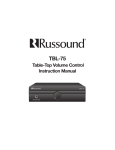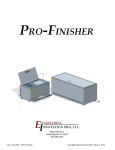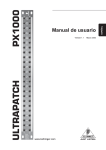Download Russound Contractor Series Instruction manual
Transcript
® ussoun TBL-75 Table-Top Volume Control Instruction Manual INTRODUCTION The TBL-75 Volume Control is a free-standing stereo speaker-level volume control with a front panel headphone jack and buitt-in impedance-matching options. It connects between the speaker outputs of an amplifier or receiver and a pair of speakers. The TBL-75 adjusts the volume of the speakers connected to it by adjusting the signal from the amplifier to the speakers. The TBL-75 is ideal for private listening as its tabletop design is suitable for placement on a desk or bedside stand. When headphones are connected through the headphone jack, it interrupts the speaker output, and the volume knob then controls the headphone audio levels. When using the TBL-75 in installations with more than one pair of speakers or with additional volume controls, the TBL-75 has a rear panel impedance selector switch to be set at 1X, 2X, 4X and ax. The 1X setting allows the volume control to be used as a standard control. The 2X, 4X, and ax settings allow it to be used as an UltraMatch™ impedance matching volume control. The UltraMatch ™ volume control matches the minimum output impedance of the amplifier or receiver, in addition to adjusting volume. It eliminates the need for a speaker selector or additional impedance matching equipment. PROPER SELECTOR SWITCH SETTING FOR IMPEDANCE MATCHING By determining the drive capability of the amplifier with a few simple calculations, you can determine the number of speakers the system can safely operate. The selector switch must be set in a position that correctly multiplies the impedance of the system to a level that is equal to or greater than the impedance of the amplifier. The switch setting can be determined using the following simple steps: 1. Determine the amplifier1s minimum impedance. The amplifier's minimum impedance is usually found following Wattage and Frequency Response in the amplifier's specification page of the manual. It may also be listed on the back panel of the amplifier near the speaker terminals. The impedance value is expressed in ohms. 2. Identify the correct impedance-matching chart according to the amplifier's minimum impedance. There are two impedance matching charts, one for a ohm amplifiers and one for 4 ohm amplifiers. Choose the chart that describes your amplifier. If your amplifier is 6 ohm stable, use the a ohm chart. 3. Determine the impedance for each pair of speakers by referring to its manual. 4. Determine the total number of 4 ohm pairs of speakers. (rows on charts) If using 6 ohm speakers, treat them as 4 ohm speakers 5. Determine the total number of 8 ohm pairs of speakers. (columns on charts) 2 6. Follow the appropriate row and column to determine selector switch settings. 7. Set the selector switch to the correct X setting as determined. CONSIDERATIONS 1. Make sure that your amplifier has adequate wattage for the number of speakers. Watts per channel divided by the number of pairs should equal or exceed the individual speaker's minimum wattage requirements. 2. It is recommended to use an UltraMatch™ volume control for each room. 3. Every jumper setting must be set on the same setting throughout the system. 4. A minimum speaker load of 4 ohms can be connected to the output of each UltraMatch™ volume control. Impedance Matching Charts For UItraMatch™ Impedance Matching For 4 Ohm Amplifiers BOhm Pairs 0 °1 1X - 2 2X 3 4X 4 4X 5 8X 6 8X 7 8X 8 8X 1 1X 2X 4X 4X 8X 8X 8X 8X 2 1X 2X 4X 4X 8X 8X 8X 8X 3 2X 4X 4X 8X 8X 8X 8X 4 2X 4X 4X 8X 8X 8X 8X 5 4X 4X 8X 8X 8X 8X 6 4X 4X 8X 8X 8X 8X 7 4X 8X 8X 8X 8X 8 4X 8X 8X 8X 8X 9 8X 8X 8X 8X 10 8X 8X 8X 8X 11 8X 8X 8X 12 13 14 15 16 8X 8X 8X 8X 8X 8X 8X 8X 8X Impedance Matching For 8 Ohm Amplifiers Example: The table to the right shows an a ohm minimum impedance amplifier with 1 pair of 4 ohm speakers and 3 pair of a ohm speakers. The chart indicates the jumper setting should be set at ax. BOhm Pairs _+-0""",+-""",,,-+_2__ _4,"",+_5........6""-+-__ 7 -+--8-1 ~ 2X . . .;.4,;. .;,.X+-8;;;.;...X~8X~8.....;.X..........,;;;.8X~ ~ 8X 8X 8X ~ ................ e _-+---f---+_+--.....I....----I 8X .;: ° o ~ ......;;...~~;.......a....;....;....J 3 TYPE OF SPEAKER WIRE For most applications, we recommend you use 16 or 18 gauge, stranded copper speaker wire for the TBl-75 speaker connections. For wiring runs longer than 100 feet, 14 gauge wire is recommended. Using speaker wire larger than 14 gauge for TBl-75 Volume Controls is not recommended as the wire may not fit into the connectors. NOTE - Never use solid-core, aluminum or Romex® type wire with volume controls. When running speaker wires inside walls, most states and municipalities in the U.S. specify that you must use a special type of speaker wire. Usually, the requirement is that the wire has a specific "Cl" fire rating, such as "Cl-2" or "Cl-3". Consult your Russound dealer, building contractor, or local building and inspection department if unsure about which type of wire is best for your application. If you need speaker wire, we recommend you order Russound AW series wire. The AW Series speaker cables use multi-strand copper wire and high-temperature PVC jackets specially designed for snaking through the walls and for long speaker runs. OPTIONAL RUSSOUND COMPONENTS The wiring diagram for the TBl-75 includes an ALTx and optional EZB-1 SC. The EZB1SC is recommended but not required for TBl-75 installation. The EZB-SC connecting block is a neat, compact wiring device capable of connecting four volume controls to an amplifierls outputs. The AlTx volume control is an in-wall stereo volume control. WIRING INSTRUCTIONS 1. Connect the speaker leads from the amplifier's outputs to the connector labeled Input on the TBl-75. The wires should stay consistent, left + of the amplifier to left + Input of the TBl-75, observing polarity and identification. CAUTION: Do not reverse the input and output connections on the TBl-75!! 2. Connect speaker wire from the TBl-75 Output connector to the speakers. WIRING INSTRUCTIONS USING OPTIONAL EZB1-SC 1. Connect the speaker leads from the amplifier's outputs to the connector labeled Input on the EZB-1 SC. The wires should stay consistent, left + of the amplifier to left + Input of the EZB-1 SC, observing polarity and identification. 2. Connect speaker wire from the EZB-1 SC Output connector to the Input connector on the TBl-75. 3. Connect speaker wire from the TBl-75 Output connectors to the speakers. 4 Speaker wire ~ .-/ TBL-75 / ~ + ~I 1= ~ I•• • 0,0 lfi " I 0.01 q 'fl Iii SPr.-."':[111 ~ ..~ I: •••• :1 :[3 I(C-:::,"~ ICE: I I I I I I I I Speaker wire I I I I I I I I~ : " II ~ ~ ll"""': @@ @@ \Iii. .~ _1NP\Jl_ SPEM(P' -~ = lX:Jl:'X :.~.I 2X • l+ 4X II ~ III " iii ~. ~ l· R· R+ -"'", 1- ~ QII e(:,i.)\ e MADE IN CHINA Speaker wire ~~ ~. I I I URussound ~ c1 e'~ all ~ ~ &. I '-- I e~ Speakers I o I L -+L o IH-t~ Speaker wire D D ALTx volume control '----------i Speakers e··~' .... r-"Oe--'r '.-' e-:=-\ ;.6)':. :--., ~~ e'¥e Speaker wire Typical TBL-75 Configuration (optional connections for EZB-1SC) 5 OPERATION 1. Make sure the amplifier or receiver is OFF and set the volume to minimum. 2. Set the TBL-75 volume to maximum (fully clockwise). 3. Turn on the amplifier or receiver and select a music source, such as tuner or CD player: 4. Slowly turn up the amplifier or receiver volume and set it to a comfortable (not maximum) listening level. Be careful not to overdrive your amplifier: If the sound becomes muddy or distorted, you have reached the limit of your amplifier's volume capability and should quickly reduce the volume to avoid damaging your speakers. NOTE: 12 o'clock (50%) on most receivers is full volume. An amplifier that is being driven beyond its potential will produce DIC voltage (clipping) which will not pass through a transformer, resulting in improper signal transfer and possible damage to volume control and amplifier. 5. Adjust the volume of the speakers to the desired listening level using the TBL-75. 6. You can turn off the speakers in each room by turning the knob on the TBL-75 completely counter-clockwise. IMPORTANl: If you are unsure of any of the installation procedures, the products should be installed by a professional custom installer: SPECIFICATIONS Power Handling: # of steps: Total Attenuation: Frequency Response: Impedance Multipliers: Terminations: Wire Size; Dimensions: Weight: 6 126 Wattslch. power handling, 42 watts/ch. RMS 12 steps, including "Off" 43db 20Hz - 20kHz, +1/-.5dB at rated power 1X, 2X, 4X and ax Spring-loaded terminals Up to 14 gauge wire 6.0W x 6.50 x 1.875H inches (15.2 x 16.5 x 4.8 cm) 2.5 Ibs. (1.14kg) WARRANTY All Russound volume controls are fully guaranteed against all defects in materials and workmanship as long as the original purchaser and user of the volume control owns the unit. During the warranty period, Russound, at its option, will replace or repair any defective part and correct any defect in workmanship without charge for parts or labor. For this warranty to apply, the unit must be installed and used in accordance to its written instructions. If necessary, repairs must be performed by Russound. The unit must be returned to Russound at the owner's expense and with prior written permission of Russound. Accidental damage and shipping damage are not considered defects, nor is damage resulting from abuse, or from servicing performed by an agent or person not specifically authorized in writing by Russound. Damage to or destruction of components due to application of excessive power voids the warranty on those parts. Repairs to components damaged or destroyed due to application of excessive power will be made by charging the owner the retail value of the parts and labor for the repair. To return items for repairs, the unit must be shipped to Russound at the owner's expense, along with a written explanation of the nature of the service required. The unit must be packed in a corrugated container with at least 3 inches of resilient material to protect the unit from damage in transit. Russound reserves the right to request proof of purchase. Except to the extent prohibited by applicable law, no other warranties, whether expressed or implied, other than the express warranties stated herein, shall apply to units sold to the purchaser. Russound shall not be liable for any implied warranty of merchantability or fitness for a particular purpose to any person other than the original purchaser and user. Russound sells products only through authorized Dealers and Distributors to ensure that customers obtain proper support and service. Any Russound product purchased from an authorized dealer or other source, including retailers, mail order sellers and online sellers will not be honored or serviced under existing Russound warranty policy. any sale of products by an unauthorized source or other manner not authorized by Russound shall void the warranty on the applicable product. All Russound TBl-75 volume controls conform to Ul Standard 1492 First Edition, and for Canada Certified to CSA Standard 22.2 No. 1-M94. This certification assures that your TEL-75 volume control has been designed and tested for safety. l1Russou n ~_® 5 Forbes Rd. Newmarket, NH 03857 Tel 603.659.5170 • Fax 603.659.5388 e-mail: [email protected] Rev. 1 06/1 0/04
















